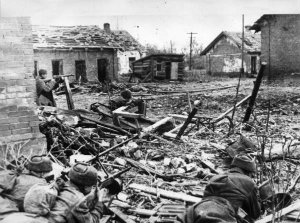Summary | Excerpt | Reviews | Beyond the Book | Read-Alikes | Genres & Themes | Author Bio

Critics' Opinion:
Readers' Opinion:
First Published:
Aug 2014, 304 pages
Paperback:
Sep 2015, 228 pages
 Book Reviewed by:
Book Reviewed by:
Kate Braithwaite
Buy This Book
This article relates to The Undertaking
Berlin, August 20th, 1942
My dear Peter,
The Fuhrer has just announced that we are to take Stalingrad. To hear it from our leader's lips is thrilling. Imagine it, Peter, a German Empire stretching from the Atlantic to the Volga. It is beyond anything I could have hoped for. The man is truly a genius.
And you are to be part of it, Peter. I am very proud of you and promise to stop badgering you about home leave.
 This is the opening of one of Katherina's letters to her husband Peter in Audrey Magee's The Undertaking. Peter is an infantryman and his wife assures him that the German army will have taken Stalingrad in a couple of weeks. But true to the historical facts, as Peter and his fellow soldiers press forward from Kiev and towards Stalingrad, they find themselves on the losing side of one of the bloodiest battles in history with an estimated nearly two million casualties.
This is the opening of one of Katherina's letters to her husband Peter in Audrey Magee's The Undertaking. Peter is an infantryman and his wife assures him that the German army will have taken Stalingrad in a couple of weeks. But true to the historical facts, as Peter and his fellow soldiers press forward from Kiev and towards Stalingrad, they find themselves on the losing side of one of the bloodiest battles in history with an estimated nearly two million casualties.
In 1942, Stalingrad, now Volgograd, was a large industrial city important to Russia in the production of arms and vehicles and geographically crucial to Hitler's wider campaign in the East because of its transport and communication links. As such, the city became a significant target for Germany, with the added attraction of the symbolic value of being named after the Russian leader Josef Stalin. The German Sixth Army, led by General Paulus, was ordered to take Stalingrad.
Initially, the attack went well for Germany. The Russians retreated and as the Sixth Army approached the outskirts of the city, Hitler felt confident enough to divert armored support elements south. This left the infantry to tackle taking control of the city street by street, and the resistance they faced surprised them. As the fighting became protracted, winter approached. By initially withdrawing, the Russians had been able to re-build and prepare for a counter offensive. When the first snows fell in November 1942, the Russians counter-attacked in a pincer movement and trapped the Sixth Army inside Stalingrad.
The conditions faced by the German soldiers trapped in the city were appalling. Initially some supplies were air dropped by the Luftwaffe but the size of the army and the weather conditions made the task near impossible. When the Germans lost control of airfields near Stalingrad, the infantry began to starve. At no point would Hitler allow his soldiers to give up the ground they had taken or attempt to break out from the city.
Finally, in February 1943, General Paulus and several hundred thousand surviving soldiers surrendered to the Russians. Of those that surrendered, only 5000 ever made it back to Germany, the rest did not survive the death marches to, and internment in, the Russian labor camps. The defeat of the Germans at Stalingrad saw the tide turn on the war in Europe; the Germans withdrew substantial forces from the West to replace their losses in the East, but never regained the initiative on the Eastern Front.
In Stalingrad the population at the beginning the war was 850,000. By the end of the war it was 1,500. The combined Axis and Soviet casualties are estimated to be in the region of 1.7 to 2 million (combining deaths, injuries and captures, both civilians and soldiers).
Picture of Soviets preparing to ward off assault from Germans in Stalingrad suburb from public domain
Filed under People, Eras & Events
![]() This "beyond the book article" relates to The Undertaking. It originally ran in November 2014 and has been updated for the
September 2015 paperback edition.
Go to magazine.
This "beyond the book article" relates to The Undertaking. It originally ran in November 2014 and has been updated for the
September 2015 paperback edition.
Go to magazine.





The House on Biscayne Bay
by Chanel Cleeton
As death stalks a gothic mansion in Miami, the lives of two women intertwine as the past and present collide.

The Flower Sisters
by Michelle Collins Anderson
From the new Fannie Flagg of the Ozarks, a richly-woven story of family, forgiveness, and reinvention.

The Funeral Cryer by Wenyan Lu
Debut novelist Wenyan Lu brings us this witty yet profound story about one woman's midlife reawakening in contemporary rural China.
Your guide toexceptional books
BookBrowse seeks out and recommends the best in contemporary fiction and nonfiction—books that not only engage and entertain but also deepen our understanding of ourselves and the world around us.